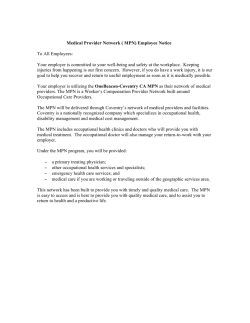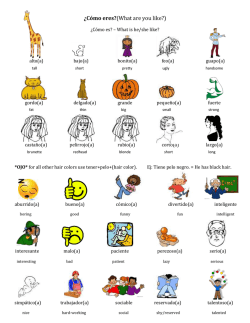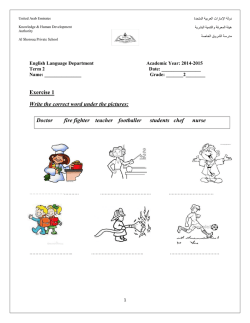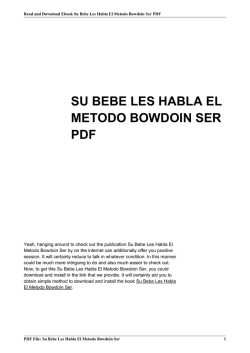
OBJECT PRONOUNS - Saint John the Beloved School
OBJECT PRONOUNS Yo = ME (me) Nostros = NOS (us) Tú = TE (you) Vosotros = OS (y’all) Él/ella/ud. = LE (him/her) Ellos/ellas/uds. = LES (them) ** Object pronoun always comes right before the verb ME, TE, NOS - Can be direct OR indirect object pronouns ** DIRECT OBJECT PRONOUN - tells you who or what directly receives the action of the verb ➢ In English … Patrick hit the ball . (hit= verb, ball= direct object ⇢ ball directly receives the action of the verb “hit” ) ➢ Remember our Vocabulary 1 expressions… ○ Me enoja el niño. = ___________________________________________ ○ Te molesta la clase. = ___________________________________________ ➢ El médico me ve . = The doctor sees me. ➢ El médico me examina .= ___________________________________________ ** INDIRECT OBJECT PRONOUN - tells you TO WHOM or FOR WHOM an action occurs ➢ In English… She gave the present to her mom. ○ What is our verb? What is our direct object? What is our indirect object? ➢ El médico me habla . = The doctor speaks TO ME. ➢ El médico te da una receta. = ___________________________________________ ➢ ¿ Te habla el médico? = The doctor speaks to you? Sí, me habla el médico. = The doctor speaks to me. LE, LES - INDIRECT OBJECT PRONOUNS (IOPs) ↑ ➢ La médica le da una receta. = The doctor gives a prescription to him/her/you (él/ella/ud.) ➢ La médica les habla. = The doctor speaks to them. ➢ Le and Les are BOTH masculine and feminine. Le and Les are often used with another phrase to clarify to whom they refer. ○ La profesora le habla a la muchacha. / La profesora le habla al muchacho. ○ Le hablo a ella. / Le hablo a él. ○ La médica les habla a los enfermeros . Let’s break it down… El médico le da una receta a su paciente = The doctor gives a prescription to his patient. Now it gets tricky when we are asking & responding to questions… Does the doctor give the prescription to M aria ? ↳ indirect object Yes, the doctor gives the prescription to h er . ↳ indirect object pronoun ¿El médico le da una receta a María? = Does the doctor give a prescription to Maria? Yes, the doctor gives the prescription to her. = Sí, le da una receta a María. ** Remember, a María is added to clarify who LE is ¿Te habla la profesora? = Does the teacher talk to you? Sí, me habla la profesora. = Yes, the teacher talks to me. ¿Le duele la garganta? = Does the throat hurt him/her? Sí, le duele la garganta. = Yes, the throat hurts him. ¿Te receta unas medicinas? = Is some medicine prescribed to you? Sí, me receta unas medicinas. = Yes, some medicine is prescribed to me. Complete the sentence with the correct object pronoun (ME, TE, LE, NOS, LES). ** Notice that in #1 & #2, the second sentence is responding to the question. 1. Cuando estás en la clase de inglés, ¿ ________ habla en inglés la profesora? - 2. Sí, siempre _________ habla en inglés. Cuando tú y los otros alumnos están en la clase de español, ¿ __________ habla el profesor en español? - Sí, él ____________ habla siempre en español. 3. El paciente abre la boca y el médico __________ examina la garganta. 4. Yo abro la boca y el médico ____________ examina la garganta. 5. El médico ____________ da una receta a sus pacientes cuando están enfermos y necesitan medicina. 6. Mi madre y yo vamos a la farmacia y el farmacéutico ____________ vende la medicina que necesitamos. ➢ ¿Qué te duele? = _____________________________________________ ______________________________________________________________
© Copyright 2026





